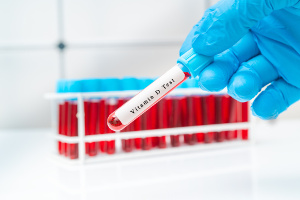New focus on cancer patients who lack vitamin D
 Vitamin D controls a host of different biochemical processes that are of importance to our health. Moderate vitamin D deficiency is rather common, and severe deficiency is one of the reasons why chronically ill cancer patients are put in intensive care and die within a year. Cancer patients who have been in intensive care can actually benefit from takin vitamin D supplements, according to an Austrian study that is published in Nutrients. The study supports earlier research that demonstrates different anti-cancer mechanisms in vitamin D.
Vitamin D controls a host of different biochemical processes that are of importance to our health. Moderate vitamin D deficiency is rather common, and severe deficiency is one of the reasons why chronically ill cancer patients are put in intensive care and die within a year. Cancer patients who have been in intensive care can actually benefit from takin vitamin D supplements, according to an Austrian study that is published in Nutrients. The study supports earlier research that demonstrates different anti-cancer mechanisms in vitamin D.
Vitamin D deficiencies are widespread among cancer patients for several reasons: Too much time spent indoors, prolonged hospitalization, avoidance of sunlight after radiation and chemotherapy, and poor nutritional status due to lack of appetite. The new study was carried out by scientists at Medical University of Vienna in Austria and looked at blood levels of vitamin D in critically ill cancer patients in intensive care. The scientists also looked at whether vitamin D deficiency and critical deficiency in the cancer patients increased their need for intensive care, hospitalization, and death after one year
This is the first study of vitamin D and critically ill cancer patients, and it is the largest study of patients in intensive care.cancer prevention
Lack of vitamin D makes cancer even more life-threatening
The scientists analyzed patients and data from an earlier study that was conducted during the period between October 2014 and January 2019. According to the report, lack of vitamin D is rather common among critically ill cancer patients that are in need of intensive care, but the effect on mortality within a one-year time limit remained unknown.
Blood samples were taken from the patients within 72 hours of being admitted to intensive care. The samples revealed that 74 percent of the patients lacked vitamin D and 54 percent had severe vitamin D deficiency. Independent factors that were linked to vitamin D deficiency included young age, resistance to cancer therapy, and sepsis-related organ failure (SOFA). After adjusting for these factors, the scientists found that serious vitamin D deficiency in itself increased the risk of dying in the hospital within one year but it did not increase the risk of dying in intensive care.
The scientists conclude that vitamin D deficiency is common among critically ill cancer patients and it is important to pay extra attention to seasonal deficiency, to younger cancer patients, and to patients with critical organ dysfunction.
They also point to certain limitations with the study, for instance the fact that dark-skinned patients were underrepresented. Moreover, they explain that age, genes, race, smoking habits, medicine use, renal replacement therapy (RRT), and infections can affect blood levels of vitamin D in critically ill patients and in the general population. The researchers also call for additional studies, as there was no control group.
The new study is published in Nutrients and supports earlier studies that show a link between vitamin D and cancer.
Blood levels of vitamin D
|
High-dosed vitamin D supplements reduce cancer risk and cancer mortality
According to several recent meta-analyses, taking high-dosed vitamin D supplements reduces the risk of getting different types of cancer. It also improves the odds of survival among those who have been diagnosed with cancer.
References
Nina Buchtele et al. Prevalence and Impact of Vitamin D Deficiency in Critically Ill Cancer Patients Admitted to the Intensive Care Unit. Nutrients 2021
Nikki Hancocks. Study puts cancer patient vitamin D deficiency under the spotlight. NUTRAingredients.com 2021
Paulette D Chandler et al. Effect of Vitamin D3 Supplements on Development of Advanced Cancer. JAMA 2020
Brian P. Dunleavy. Study: Vitamin D reduces risk for metastatic cancer, death by 17 %. UPI Nov. 18, 2020
Vital Study Findings 2020
Search for more information...
- Created on .








